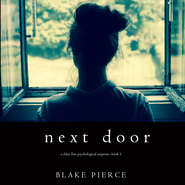По всем вопросам обращайтесь на: info@litportal.ru
(©) 2003-2025.
✖
Cause to Kill
Настройки чтения
Размер шрифта
Высота строк
Поля
Artist, Avery thought. He said our killer is an artist.
“Who teaches there?” she asked. “Who owns the studio?”
“How the fuck should I know?” Do I have a thousand hands, now?” he barked. “You gave me like, a hundred jobs. I have no idea who teaches that fuckin’ class. I told you, I’m waiting to hear back.”
She closed her eyes.
“OK,” she said. “Thanks.”
“You coming back to help me out or what?” Finley complained.
“I need to tie up some loose ends,” she said. “You have Cindy’s address? And Tabitha’s? I want to swing by their dorms and see what I can find.”
“I was already at Tabitha’s dorm. Just some chick room. Fancy clothing and stupid posters. Nothing there.”
“Let me be the judge of that.”
* * *
Cindy had lived in a house not far from the Kappa Kappa Gamma suite, or from her boyfriend. The two-story white Tudor with blue trim housed two people. Cindy rented out the first floor; the second floor was inhabited by another Harvard senior.
Avery called ahead to ensure Harvard officials would let her inside.
A spare set of keys was under a rock by the front porch.
Cindy’s apartment smelled like stale air. There were four main rooms: living room, bedroom, a spare room she’d converted into an office, and the kitchen. A few pieces of modern art adorned the walls.
The office was filled with a slew of library-issued texts, along with a number of paperback romances. Papers were stacked on the desk.
Avery checked through the files. Medical bills, class folders, job interview letters, resumes. Everything was neat and orderly. Avery took notes on her phone: Cindy’s medical provider, every teacher she’d had, the places she’d interviewed, and her current employer: Devante Accounting Firm. The letter of her acceptance as a junior accountant in their firm was proudly displayed on the desk.
No mention of the art class could be found, but there was a framed, hand-painted picture on the wall that had Cindy’s signature at the bottom. The image was a bowl of fruit. Avery turned the picture over. On the back was a stamp: Art for Life, their address, and the logo of a hand depicted as a paint palette. Avery put everything back the way she found it, headed outside, and hopped in her car.
MIT was called ahead to ensure they would allow her into Tabitha’s room. The dean’s assistant said he would take care of everything.
As soon as she hung up, Avery’s phone rang.
“It’s Jones,” came a Jamaican voice.
“Tell me something,” Avery said.
“Nothing out here, man. The cabin is empty.”
“What the hell have you been doing all day?”
“Research, man,” Jones complained, “investigating. Took a while to get up here. Had to get the keys, right? Then Thompson wanted to drive and he has absolutely no sense of direction. GPS got us all screwy. But,” he admitted with another swig of his beer, “we got here and turned the place over. Nothing. You sure the kid stayed here?”
“You wasted a whole day,” Avery said.
“You’re not listening, Black! We been working hard.”
“Two girls are dead,” Avery said. “Or maybe you forgot that? We’ve got a serial killer on the loose and you’re jerking around in a lakeside cabin. Get back on Cambridge surveillance. And this time,” she snapped, “I want a detailed report on my desk by tomorrow afternoon. I want to know exactly how you spent every hour. You hear me?”
“Aw, come on! Black. I’m begging you,” Jones cried. “That job is crazy. Ain’t no way to track a car for miles and miles like that. It’s impossible. I need like, ten other people.”
“Take Thompson.”
“Thompson?” Jones laughed. “He’s worse than Finley.”
“Remember,” Avery emphasized. “A detailed report on my desk tomorrow afternoon. Make sure Thompson understands. Screw this up and I call Connelly.”
She hung up.
How am I supposed to do anything in Homicide if half my team won’t even respect my authority? she fumed.
By the time she reached her next destination, the sky was dark.
Tabitha had lived in the heart of the MIT, just off Vassar Street. Her roommate answered the door; she was a small, mousy girl with long black hair, glasses, and a face covered in pimples. The room was large: a main living area, open kitchen, and two bedrooms.
“Hi,” the girl said, “you must be Avery.”
“Yeah, thanks for letting me in.”
“That’s her room, there,” she pointed.
The girl appeared dour and miserable.
“Were you two friends?” Avery wondered.
“Not really,” she said and walked away. “Tabitha was popular.”
Tabitha’s room was extremely cluttered.
The filing cabinet was more of a place to cram loose papers. A quick search uncovered everything from receipts to a resume and a smelly sandwich wrapper. The most revealing item was the number of pictures that lined the walls, all seemingly done by Tabitha herself: farm scenes, the MIT skyline, a bowl of fruit.
Avery looked at the back of one of the framed paintings.
A stamp read: Art for Life.
CHAPTER TENTY
Molly Green was having a rough night. She puffed a lock of blond hair out of her face, wiped her brow, and pretended to roll up her sleeves.
“Luke and Gidget!” she cried. “I’ve had just about enough of this!”
The house where she worked as a part-time nanny appeared large and empty. She stood in the oversized living room on the first floor and searched behind couches. Face against the sliding glass doors that led to the back porch, she cupped her eyes from the interior light and thought: They better not be out there.
No one was in the kitchen, closets, or downstairs bathroom.
“Who teaches there?” she asked. “Who owns the studio?”
“How the fuck should I know?” Do I have a thousand hands, now?” he barked. “You gave me like, a hundred jobs. I have no idea who teaches that fuckin’ class. I told you, I’m waiting to hear back.”
She closed her eyes.
“OK,” she said. “Thanks.”
“You coming back to help me out or what?” Finley complained.
“I need to tie up some loose ends,” she said. “You have Cindy’s address? And Tabitha’s? I want to swing by their dorms and see what I can find.”
“I was already at Tabitha’s dorm. Just some chick room. Fancy clothing and stupid posters. Nothing there.”
“Let me be the judge of that.”
* * *
Cindy had lived in a house not far from the Kappa Kappa Gamma suite, or from her boyfriend. The two-story white Tudor with blue trim housed two people. Cindy rented out the first floor; the second floor was inhabited by another Harvard senior.
Avery called ahead to ensure Harvard officials would let her inside.
A spare set of keys was under a rock by the front porch.
Cindy’s apartment smelled like stale air. There were four main rooms: living room, bedroom, a spare room she’d converted into an office, and the kitchen. A few pieces of modern art adorned the walls.
The office was filled with a slew of library-issued texts, along with a number of paperback romances. Papers were stacked on the desk.
Avery checked through the files. Medical bills, class folders, job interview letters, resumes. Everything was neat and orderly. Avery took notes on her phone: Cindy’s medical provider, every teacher she’d had, the places she’d interviewed, and her current employer: Devante Accounting Firm. The letter of her acceptance as a junior accountant in their firm was proudly displayed on the desk.
No mention of the art class could be found, but there was a framed, hand-painted picture on the wall that had Cindy’s signature at the bottom. The image was a bowl of fruit. Avery turned the picture over. On the back was a stamp: Art for Life, their address, and the logo of a hand depicted as a paint palette. Avery put everything back the way she found it, headed outside, and hopped in her car.
MIT was called ahead to ensure they would allow her into Tabitha’s room. The dean’s assistant said he would take care of everything.
As soon as she hung up, Avery’s phone rang.
“It’s Jones,” came a Jamaican voice.
“Tell me something,” Avery said.
“Nothing out here, man. The cabin is empty.”
“What the hell have you been doing all day?”
“Research, man,” Jones complained, “investigating. Took a while to get up here. Had to get the keys, right? Then Thompson wanted to drive and he has absolutely no sense of direction. GPS got us all screwy. But,” he admitted with another swig of his beer, “we got here and turned the place over. Nothing. You sure the kid stayed here?”
“You wasted a whole day,” Avery said.
“You’re not listening, Black! We been working hard.”
“Two girls are dead,” Avery said. “Or maybe you forgot that? We’ve got a serial killer on the loose and you’re jerking around in a lakeside cabin. Get back on Cambridge surveillance. And this time,” she snapped, “I want a detailed report on my desk by tomorrow afternoon. I want to know exactly how you spent every hour. You hear me?”
“Aw, come on! Black. I’m begging you,” Jones cried. “That job is crazy. Ain’t no way to track a car for miles and miles like that. It’s impossible. I need like, ten other people.”
“Take Thompson.”
“Thompson?” Jones laughed. “He’s worse than Finley.”
“Remember,” Avery emphasized. “A detailed report on my desk tomorrow afternoon. Make sure Thompson understands. Screw this up and I call Connelly.”
She hung up.
How am I supposed to do anything in Homicide if half my team won’t even respect my authority? she fumed.
By the time she reached her next destination, the sky was dark.
Tabitha had lived in the heart of the MIT, just off Vassar Street. Her roommate answered the door; she was a small, mousy girl with long black hair, glasses, and a face covered in pimples. The room was large: a main living area, open kitchen, and two bedrooms.
“Hi,” the girl said, “you must be Avery.”
“Yeah, thanks for letting me in.”
“That’s her room, there,” she pointed.
The girl appeared dour and miserable.
“Were you two friends?” Avery wondered.
“Not really,” she said and walked away. “Tabitha was popular.”
Tabitha’s room was extremely cluttered.
The filing cabinet was more of a place to cram loose papers. A quick search uncovered everything from receipts to a resume and a smelly sandwich wrapper. The most revealing item was the number of pictures that lined the walls, all seemingly done by Tabitha herself: farm scenes, the MIT skyline, a bowl of fruit.
Avery looked at the back of one of the framed paintings.
A stamp read: Art for Life.
CHAPTER TENTY
Molly Green was having a rough night. She puffed a lock of blond hair out of her face, wiped her brow, and pretended to roll up her sleeves.
“Luke and Gidget!” she cried. “I’ve had just about enough of this!”
The house where she worked as a part-time nanny appeared large and empty. She stood in the oversized living room on the first floor and searched behind couches. Face against the sliding glass doors that led to the back porch, she cupped her eyes from the interior light and thought: They better not be out there.
No one was in the kitchen, closets, or downstairs bathroom.

















